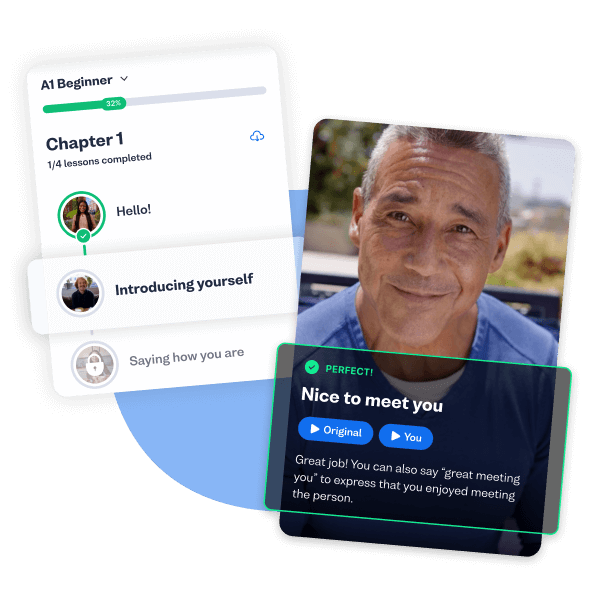Informal vs Formal Language: Usage and Differences
Follow the tips in this article and never get formal and informal language mixed up again
I want to learn...
Learning words and grammar structures is not only about memorizing meanings or grammar forms. It’s also about using appropriate language for the situation.
To be an effective communicator, you need to understand register. Register is how you say something in relation to your audience. It’s a scale from very casual and intimate (how you talk to friends and family) to formal (how you speak in professional situations).
In this article, you’ll learn all about formal and informal language, their similarities and differences, and when you should (or shouldn’t) use them.
What is formal language?
Formal language is the words and grammar used in formal situations. People use formal language mostly in written communication in professional or academic settings. Formal language, on the other hand, is the everyday words and grammar people use in both written and spoken communication.
What is the difference between formal and informal language?
Let’s take a look at the characteristics of informal and formal language.
6 differences between formal and informal language
| Informal language | Formal language |
|---|---|
| Colloquialisms “Wanna get a drink?” |
Standard, non-colloquial language “Would you like to get a drink?” |
| Slang “It’s a hot one today, innit?” |
Formal vocabulary “It’s rather warm today, isn’t it?” |
| Contractions “She’s a good person.” |
No contractions (when writing) “She is a good person” |
| Short sentences “The train’s late.” |
Complex grammar and long sentences “We regret to inform you that the upcoming train will be delayed for up to 30 minutes.” |
| Omitting modal verbs “Seen James?” |
Modal verbs “Could you tell me if you have seen James? |
| Short words “Do you need any help?” |
Longer words “Do you need any assistance?” |
These rules aren’t set in stone. You can be formal and polite without using long words and complex grammar. Prioritize clarity. Make sure your audience understands everything you say.
When you should use formal language
Now you know the difference between formal and informal language, let’s take a look at when you should use each. Here are the common situations where you can use formal language.
-
When you communicate with someone you don’t know well, often in a professional or business situation
-
In academic writing and research articles
-
In reports and presentations
-
When talking to superiors***
-
In official documents
-
In legal documents
-
In business emails**
-
In job interviews
You’ll notice that many of them are examples of written English. This is where you’ll find most formal English nowadays. When you’re talking, you don’t need to be super formal. For example, you can use contractions or short sentences. It’s more important to be polite and professional than to speak formally.
** Business emails have become less formal over time. Back in the day, we used to start them with “Dear” and end them with “Sincerely.” Like we were writing a letter. Recently, starting with “Hello” and ending with “Thanks” is fine in many situations. How formal your business emails should be depends on the industry you work in and your relationship with the reader.
*** Again, the level of formality depends on your relationship with your superiors and the context of the discussion. If it’s someone you often have informal chats with, and you’re talking about an informal topic, keep it casual.
Bonus tip: To sound polite and professional without being too formal, speak in full sentences, and avoid slang and colloquial expressions.
Why you should use formal language in these situations
Using formal language in these situations is important for two main reasons. First, it shows respect for your audience. When you’re interviewing for a job, you show respect to the interviewers. They can see you’re taking things seriously. When you’re talking to a bank manager, they use formal language to show respect to you. You're a customer and they want your business.
Formal language also enhances professionalism and credibility. If you meet with a lawyer who uses too much slang, you might feel they’re not professional enough to help you. Or if you meet a doctor who never uses full sentences, you might doubt his intelligence and experience.
Use formal language when you want to maintain distance between you and the other person. Again, this is mostly going to be in professional situations. Doctors and lawyers, for example, are often involved in sensitive and serious discussions. They use formal language because they’re being careful not to offend or upset anyone.
Formal language examples
Here are some of the most common examples of formal English and the situations in which you’ll come across them.
-
“Dear” at the start of formal letters and emails.
-
“Sincerely” at the end of formal letters and emails.
-
“We regret to inform you” instead of “sorry” in rejection letters.
-
“In spite of the fact” instead of “even though” in academic writing.
-
“I’d appreciate it if you could…” when making a request in business situations.
-
“At your earliest convenience” instead of “as soon as possible” in professional emails.
When you should use informal language
Let’s take a look at the kind of situations in which you should use informal language.
-
When communicating with people you know well in relaxed situations
-
In some business emails (see the point above)
-
When talking to friends and peers
-
In advertising and marketing
-
In everyday conversations
-
In personal emails
-
In text messages
-
In team meetings
-
When socializing
-
On social media
Why you should use informal language in these situations
Most interactions in English are in the informal register because informal is the default tone of English. Use it most of the time. It creates a relaxed and friendly atmosphere, encouraging openness and communication. When you're socializing, informal language helps you get closer to people and build relationships.
With informal language, there’s always some distance between you and the speaker — people take care not to offend anyone so they choose words more carefully. Informal language gets rid of this distance and brings people together.
Informal language examples
Here are some common examples of informal English and when it’s OK to use them.
-
“How’s it going” instead of “How are you?” or “Hello” in informal settings.
-
“No worries” can mean “You’re welcome” and “no problem” in casual situations.
-
“Hey” or “Hi” at the beginning of emails and text messages to people you know well.
-
“Speak soon” at the end of an informal email or when saying goodbye on the phone.
-
“I wanna go out tonight” instead of “I want to get out tonight” when chatting or texting with your friends or family.
Mistakes to avoid when using formal and informal language
Remember though, you don’t need to be formal to be polite. And using big words and longer sentences doesn’t make you sound smart. When you’re talking, always prioritize clarity, shorter sentences, and simpler language.
When you use the wrong register in the wrong situation, your English sounds unnatural. It creates a distance between you and the listener (if you use too-formal language) or might offend the listener (if you use too-informal language).
So be careful when you’re using formal grammar structures and longer words because it can sound unfriendly. But also be careful using slang or colloquial language because it can make you sound unprofessional.
Word of warning: Beware of sounding too formal when you speak. Formal English is most common in writing. The rules are much more relaxed for spoken communication. For most spoken interactions, using informal English is fine. If you want to be clear and polite, don’t use slang and use full sentences.
Do you need to know formal and informal English?
You might need to understand both of these registers. But it depends on how and why you want to use English.
For example, if you live in an English-speaking country, you’ll hear or read formal English when you deal with a bank or lawyer. So it’s important to understand it (even if you don’t use it yourself). If you’re studying English in your home country for a hobby or traveling, then maybe you don’t need to worry about formal English.
Most English interactions are in the informal register. So it makes sense to spend most of your time studying and practicing informal English. If you have dreams of living in an English-speaking country or working for a multinational company, understanding formal English is a benefit. But don’t worry too much about being able to produce formal English unless you have a specific need.
Use the right words for the right situations
Memorizing vocabulary and grammar is only one part of the language-learning puzzle. To be an effective communicator, you also need to use the right words and grammar for the situation.
90% of the time you’ll be fine using informal English (especially when speaking. But make a habit of always considering the situation and context of an interaction. Think about who you’re communicating with and how they’ll feel if you use formal or informal language.
Bonus tip: If you’re not sure whether to use formal or informal English, here’s a good compromise: Use full sentences with little slang or colloquial language, but use contractions, and simple words and sentences. Nobody will think this is too formal or too informal. You’ll be easy to understand and polite.
With Busuu you can learn business English to help you master the formal register. You can use the Busuu community to practice informal, everyday communication. And you can take Busuu lessons to learn real-life languages from real people.
Master a new language with Busuu
With Busuu, you're just a few swipes away from a community of millions to interact with. You can practice with native speakers, complete free online courses, and learn in your own way, on your own schedule.
Recommended articles
- Direct Object Pronouns in Spanish: Rules & Chart
- Spanish for Beginners: A Guide to Start Learning
- Spanish Verb Conjugations: Rules, Examples & Usage
- Loanwords in English: 60 Examples of Borrowed Words
- A Guide to Japanese Abbreviation and Acronyms
- Time in Japanese Language: Hours and Minutes
- English Descriptive Adjectives: 5 Types & Examples
- Learning English as a Second Language
- Common Idioms Related to Body Parts
- How to Remember Words From Another Language
- Learn Japanese Language: Free Online Courses
- English Present Participle Meaning, Form & Examples
New articles
- Imperative Mood: What is it? (with Examples)
- Learn All About Romaji (And Why You Don’t Need It)
- Essential Colors to Learn in English
- Possessive Pronouns to Tell Who Owns What in English
- Fare Conjugation: Learn the Verb “To Do” in Italian
- Italian Abbreviations and Acronyms You Need to Know
- Can You Learn a Language by Just Reading?
- 7 English Listening Practice Tips
- How to Write a Formal Business Email in English
- Most Used Irregular Verbs in French with Conjugation
- Days of the Week in English: Spellings and Meanings
- A Guide to Japanese Abbreviation and Acronyms

